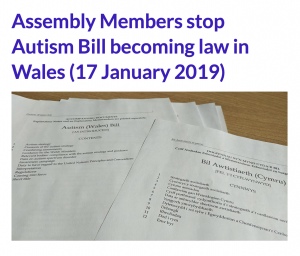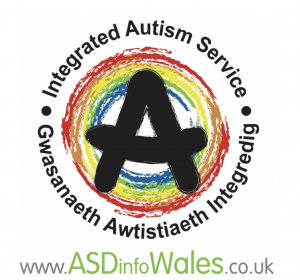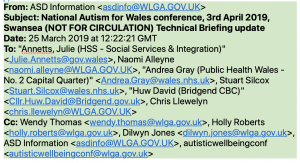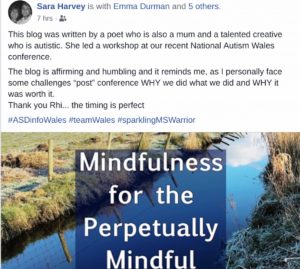

The National Autistic Society expressed disappointment with the narrow vote abandoning the Autism Act.
The launch of the Wales Integrated Autism Service in the first half of 2019 was just part of a very busy time for the autistic community in Wales.
The Assembly narrowly voted to abandon the passage of a dedicated Welsh Autism Act in January, and since then Wales has been busy consulting on the new Autism Code that we’re having instead,
The code is part of a total revamp of Additional Learning Needs in Wales, following legislation passed in 2018. It is however noticeably devoid of the agency the Act would have provided for individual autistic people and their parent carers to pursue negligent service through legal means.
By way of a flagship event, the National Autism Team in conjunction with the Integrated Autism Service (told you it was busy), held a flagship conference “Promoting Autistic Wellbeing” on 3rd April at Liberty Stadium.
The aim of the conference, hosted by the Welsh Local Government Association (WLGA) was to
“increase the wellbeing of autistic adults who are not necessarily in regular contact with public or third sector services but for whom an event about wellbeing and increasing their capacity to cope with day to day life would be a positive thing.”
 The conference was organised with the help of a ‘task and finish’ group, featuring autistic and parent/carer members and this is where a major fault-line in the conference’s aims was exposed, leading to heated disagreement, and and an accusation of direct discrimination.
The conference was organised with the help of a ‘task and finish’ group, featuring autistic and parent/carer members and this is where a major fault-line in the conference’s aims was exposed, leading to heated disagreement, and and an accusation of direct discrimination.
One of the participants of the task and finish group, Karenza Cassidy, missed a session. and was dismayed on attending the next one to find that the committee had decided to exclude learning disabled autistic adults from the conference.
Of course, this suggested “focus” is rather artfully implied in the description of the aims above, as learning disabled people would be rather more likely to be in regular contact “with public or third sector services.”
This decision was particularly significant to Karenza because she has two autistic offspring, one of whom is arguably learning disabled, and the other is not.
Karenza, her son, and his support workers however, decided that he would still benefit by going to the conference, and so booked him and three carers onto it. She then shared her feelings and the ensuing email exchange between her and the committee to a facebook support group.
“I was so enraged,”Karenza told ANM “I was trying to think pragmatically and I didn’t want to allow it to happen. I thought – if I’m feeling this rattled about it, I should put it out there. – The support was validating and helped me to process the discomfort I was feeling about it.”
The facebook group was just as outraged, especially when Karenza received a copy email to Welsh Government “colleagues” of 25th March, from the National Strategic Lead for Autism, Sara Harvey and The National Professional Lead Wendy Thomas.
Their inter-governmental email included the following sentence:
“The Team have “cleansed” the delegate list and picked up any glitches and gremlins with direct contact with delegates via email”

Recipients of the inter-governmental email reporting that learning disabled autistic people had been ‘cleansed’ from the conference list.
Asked how her children reacted to the exclusion Karenza responded:
“It’s hard to say as my son doesn’t have verbal capacity, but he went quiet during that very fractious time that week. He had put the conference onto his wall diary and calendar, and we had been speaking and preparing for it, he was interested in the lunch. All of a sudden I had to tell him it was maybe not appropriate to go,…It’s hard to tell your child “They are saying your behaviour isn’t going to fit in with others”….I wanted Sara Harvey to come and have that conversation with my son.“
Karenza’s daughter, the type of high functioning young autistic person the IAS conference was now aimed at said “what position does that put me into, I can’t go now they’ve excluded my brother?”
“She hadn’t registered, and didn’t bother” said Karenza.
 Having not attended the conference, Karenza wrote to the WLGA alleging Direct Discrimination and with a list of reparations to stave off legal action on the issue.
Having not attended the conference, Karenza wrote to the WLGA alleging Direct Discrimination and with a list of reparations to stave off legal action on the issue.
Ms Cassidy’s feeling that Sara Harvey was defensively justifying her position on Twitter was exacerbated by the late response of the WLGA to her letter:
“To the extent that you state that your son was treated less favourably, “because of his disability”, which is a pre-condition of direct discrimination for the purposes of section 13 of the Equality Act 2010, the WLGA denies that this was the case. Nobody was prevented from attending the conference but we acknowledge that the fact that the WLGA sought to question your judgement, in registering your son for a conference which was not aimed at autism individuals with his needs, could be considered to be less favourable treatment that could be said to have arisen from this. However, unfavourable treatment arising from a disability is not unlawful if it is a proportionate means of achieving a legitimate aim and is therefore objectively justified.”
So what was the “legitimate aim” that could only be met by discouraging attendance by learning disabled autistic people at a conference for autistic people?

Sara Harvey, head of Integrated Autism Service tweeted her opinion that feedback from the conference endorsed the actions of the IAS
Although Dilwyn Jones, Communications Officer for the WLGA told ANM it would not be “appropriate for an office to be interviewed on this”, the attached form statement included:
“The … event was organised to meet the needs of high functioning adults with autism in recognition that their specific needs are not always appropriately identified and supported sufficiently leading to some people suffering mental health problems as a result.”
Given the context of these comments, it does rather sound as if the presence of learning disabled people at such an event would be seen as preventing, or interfering with that need, and as such as potentially having a negative effect on non-learning-disabled autistic peoples’ mental health prospects.
The WLGA statements that the conference was both:
A – “organised to meet the needs of high functioning adults with autism”
and also
B – “open to all autistic adults who felt that they would benefit from attending the conference”
are at best ambiguous and arguably baldly contradictory, so we asked them to clarify the connection. Here’s the response:
“It was agreed that the adults themselves would self-select and as a consequence the conference was open to any autistic adults to attend who felt that that they would benefit from doing so.”
Doesn’t asking learning disabled autistic people and their carers to self-identify as appropriate to self-exclude from an autistic conference make any Direct Discrimination worse?
The WLGA had already admitted that they “sought to question [Ms Cassidy’s] judgement, in registering your son for a conference which was not aimed at autism individuals with his needs”.
Let’s not forget also that WGLA had already told Ms Cassidy that their admitted potentially “less favourable treatment” was in service of a ‘legitimate aim’, that of meeting “a need that had previously been identified”.
This was a need that all involved Welsh Government officials seem to accept necessitated “cleansing” of the attendance list.
How self-selecting is that?
 If Karenza decides to progress a claim the question can be raised in law whether it is a legitimate aim to exclude one part of the autistic community from events because they are disabled. Of course the exclusion wasn’t itself the aim, we are led to believe, but necessary in order to achieve the aim.
If Karenza decides to progress a claim the question can be raised in law whether it is a legitimate aim to exclude one part of the autistic community from events because they are disabled. Of course the exclusion wasn’t itself the aim, we are led to believe, but necessary in order to achieve the aim.
If exclusion of learning disabled autistic people from an autistic event, was seen as a ‘legitimate aim’, to preserve and promote non learning-disabled autistic peoples’ mental health, this would invite a further question…
Is coercion of learning disabled people, in order to make them self-deselect, in order to “cleanse” them, a proportionate means of achieving that aim?
As a flagship initiative Government service this could be one rabbit hole the (rather ironically named) Integrated Autism Service would perhaps be well advised not to go down.
Autism, Autism Bill, featured, Integrated Autism Service, Welsh Assembly, Welsh Government
Comments RSS Feed